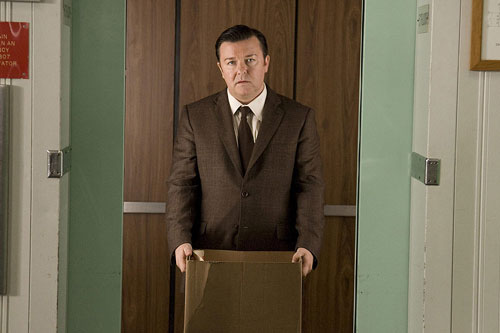The premise of “The Invention of Lying” seems destined for laughs. In a world where everyone tells the truth, where humans are physically incapable of the neurochemical processes behind fabrication, one man discovers that he has the ability to lie. The film uses both its unfalteringly honest universe and its central character’s unique gift within this universe to great comedic effect. Many of the resulting bits and jokes are simply hilarious, from the unexpected courses of conversations to frank and simple slogans for brand-name products (look out for epic tag-line reinventions for Coke and Pepsi).
Much of the humor, however, does not stem from a lie-less world, but rather from one in which everyone says exactly what is on the mind at all times. These people cannot lie, and they cannot lie by omission. Any passing thought that isn’t readily verbalized would mar an honesty to the self, disrupting the established physical laws of this very strange land. The atmosphere is extremely superficial and judgmental. The rich, beautiful, and successful cruelly point out the flaws and shortcomings of their subordinates. A social hierarchy emerges in which the genetically gifted maintain superiority. Lesser folk, rendered defenseless by a curse of integrity, submit to self-esteem slayings.

This is heavy humor indeed—like watching the science nerd get pummeled with dodge balls in gym class by his more physically competent classmates. Or, perhaps, my evaluation invests an American hypersensitivity. “The Invention of Lying” is a creation of British funnyman Ricky Gervais (TV’s “Extras,” the original BBC series “The Office”). His dark sense of humor, often at the expense of others, is standard fare for the Isles. Here in the States, it’s generally more of an acquired taste. The movie’s success on an individual basis will depend on whether the humor is perceived as amusing (a more British perspective) or unbecoming (the sign of an American palette for sure).
Either way, dry wit establishes a dark and even morbid tone from the very beginning. Certain scenes tip fully over onto the side of dramatics. It’s difficult, for instance, to consider any comedic angle as a terrified, terminally ill woman faces her final moments hooked up to monitors in a hospital bed. When the dependably mediocre Mark (played like a true comedic pro by Gervais) realizes his gifts of deceit, his life becomes sizably more promising and upbeat. A heavy climate persists, however, and lighter moments feel weighed down by murk.
This proves a problem throughout, too. The film attempts to integrate Gervais’ perverse stylings into the confines of a generic American narrative. Scenes alternate between dark, ironic comedic bits and saccharine storytelling devices. The combination can’t help but feel disjointed. Still, there’s enough innovation and hilarity involved to yield something refreshing and original. Gervais headlines a cast of strong players, and slew of cameos from recognizable and respectable faces keep things exciting. Jennifer Garner (“Juno”) offers the most thoughtful performance as Mark’s outwardly superior love interest Anna. Her flamingo physique and angled features paired with a child-like bluntness and emotional candor make for the perfect thinly-brained automaton.

As Mark explores the limitless potential of his singular ability, he begins to ascend the restrictions of superficiality. His life improves, just as he improves the lives of those around him. Ultimately, “The Invention of Lying” argues the merits of lying: subverting the truth to offer hope, to encourage creativity, to discover beauty that lies beneath the surface. But are these virtues really uncovered by dishonesty? Or do they emerge by living a more meaningful life— that is, considering a more diverse set of ideas and refusing to act on impulse alone? The film’s message feels misguided.
I suspect that “The Invention of Lying” suffered from excessive studio input by Warner Brothers. Had Gervais carried his sense of humor through the entire film, the finished product could have been, as was implied in its opening scenes, a masterwork of dark comedy. The concept remodeled for a classically American audience creates some striking tonal inconsistency. Thankfully, the innovation, strong performances, and priceless comedic gags involved make up for, to some degree, these shortcomings. It may sound like an impossibility, but rest assured: I’m not lying.
Grade: B-
“The Invention of Lying” is presented by Warner Bros. Pictures Presents in association with Radar Pictures and Media Rights Capital.
The film was written and directed by Ricky Gervais & Matthew Robinson.
Also starring are Jonah Hill (“Superbad”), comedian Louis C.K., Jeffrey Tambor (TV’s “Arrested Development”) and Fionnula Flanagan (“Yes Man”), with Rob Lowe (TV’s “Brothers and Sisters”) and Tina Fey (“Baby Mama,” TV’s “30 Rock”).
Runtime is 100 minutes.
Rated PG-13 for language including some sexual material and a drug reference.



Leave a Reply
You must be logged in to post a comment.